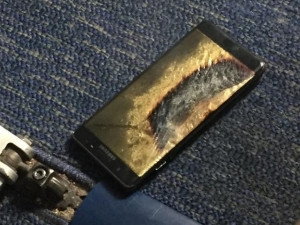
Samsung's lack of transparency on the disposal of Galaxy Note 7 leaves tonnes of precious minerals at risk of being discarded into the environment.
According to calculations by Oeko-Institut, a research and consultancy institution based in Germany, 4.3 million smartphones contain more than 20 metric tonnes of Cobalt, approximately more than one tonne of tungsten, one tonne of silver, 100kg of gold and between 20 and 60kg of palladium.
The firm says these precious materials could be recovered but would instead end up harming the environment if Samsung doesn't repurpose or reuse them.
Samsung Electronics scrapped its flagship Galaxy Note 7 smartphone last month, less than two months after its launch. The South Korean company announced the recall of Note 7s in early September following numerous reports of the phones catching fire.
The decision to scrap the Note 7 came after fresh reports of fires in replacement devices prompted new warnings from regulators, phone carriers and airlines.
Samsung Electronics and battery supplier Samsung SDI expect to announce the results of their probe into the cause of fires in some Galaxy Note 7 smartphones late this year.
Dumping implications
Following the global recall of the Samsung Galaxy Note 7, environmental activist group Greenpeace, alongside the Oeko-Institut, has calculated the potential resource implications of dumping or destroying 4.3 million smartphones.
Greenpeace believes if Samsung can do it right, this global recall will be a unique opportunity to develop a well-designed recycling system.
However, it notes Samsung has yet to make an official statement fully explaining the causes of the fault, despite a global recall of the Galaxy Note 7 and offering replacements. Samsung has said it will not recycle the phones and has still not offered any clarity on what it will do with the returned phones.
"Samsung now has an opportunity to set an example to the industry - will it recover and reuse the precious metals and other valuable materials in these 4.3 million devices and avoid an environmental disaster or will it simply dump them?" says Jude Lee, senior IT campaigner at Greenpeace East Asia.
"We are launching a global petition challenging Samsung to not dump the phones and instead take this chance to totally rethink how it designs and produces its products."
According to the environmental activist group, in April 2016, Samsung expected to sell 14 million Galaxy Note 7 devices within the first two months since its official launch. Samsung has currently produced 4.3 million devices and sold 1.8 million in more than 10 countries, including South Korea, US, Canada, Mexico, Australia, New Zealand, Singapore, Taiwan, United Arab Emirates, and China.
It adds that the Galaxy Note 7 incident reflects the disposable economic model of many smartphone manufacturers and is having a negative impact on the brand's reputation. Dumping millions of phones also raises the issue of Samsung's transparency and claims to support a 'circular economy', and of the responsibility associated with resource efficiency, it points out.
Alternative solutions
Greenpeace says in 1995, following a defect in its newly produced Anycall phones, Samsung disposed of 150 000 phones and set them alight.
It notes the Korean company might do the same to regain consumer trust, but Greenpeace urges Samsung to step up and use this crisis as an opportunity to adopt a more forward-thinking approach.
"This incident shows how fragile and wasteful our current system of production is - a system that hasn't changed since the industrial revolution. Samsung has an opportunity to rethink its production model - one that would improve recovery of precious metals and rare earth minerals, to design products that can be more easily repaired, recycled or reused," says Lee.
Greenpeace is calling on Samsung to not dump or burn the devices and minimise the environmental impact by finding alternative ways to reuse the resources. It must also be transparent and publish its plan on how it intends to deal with dismantling and disposing of these phones.
Share